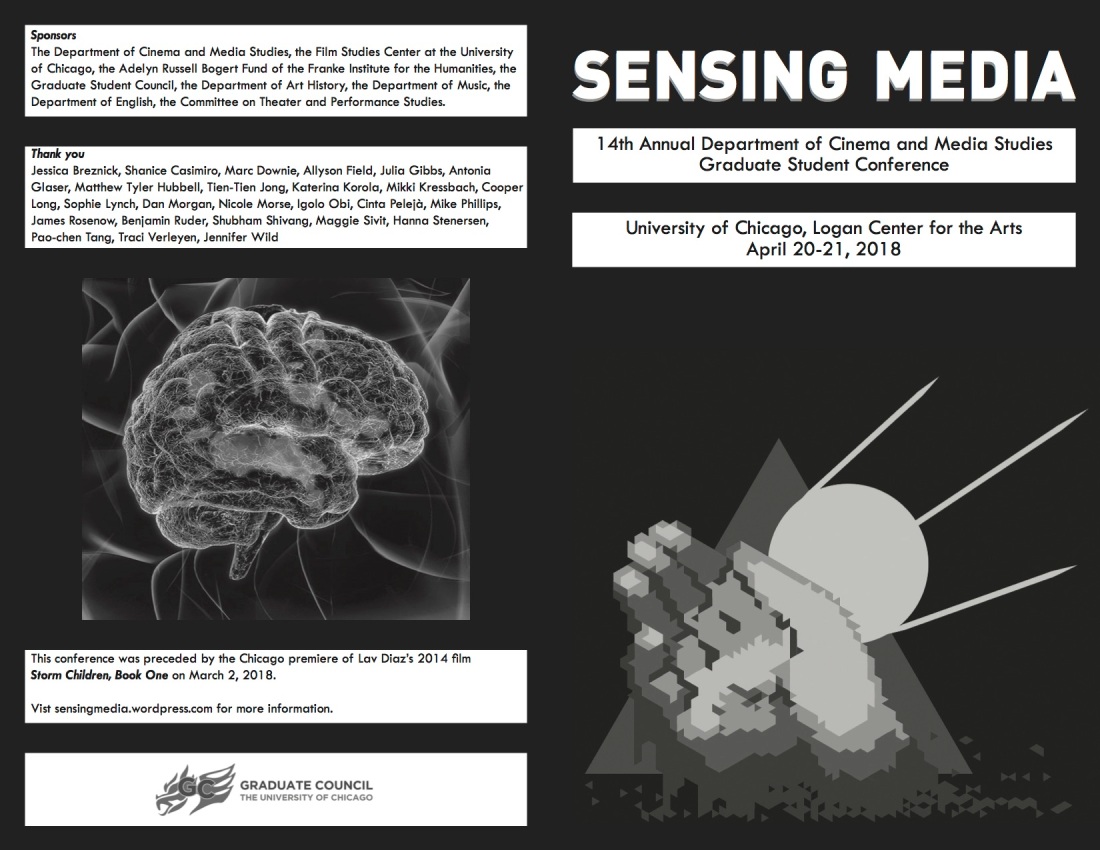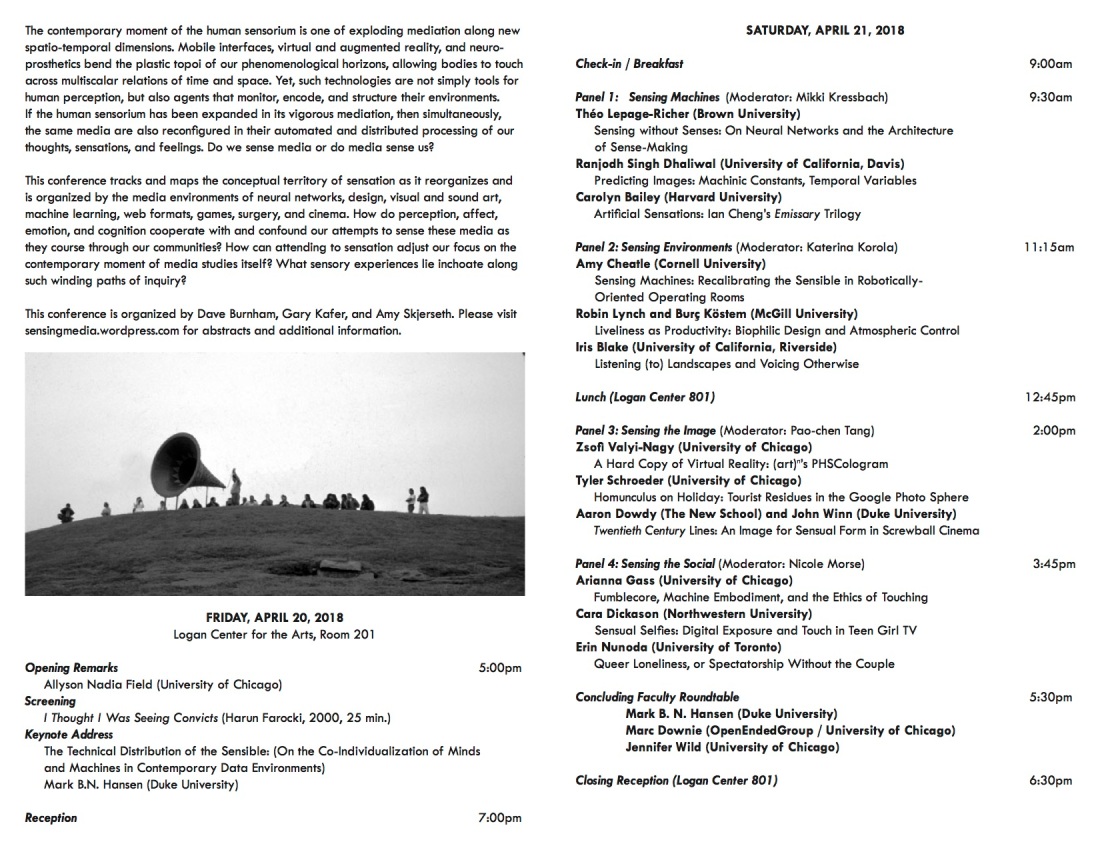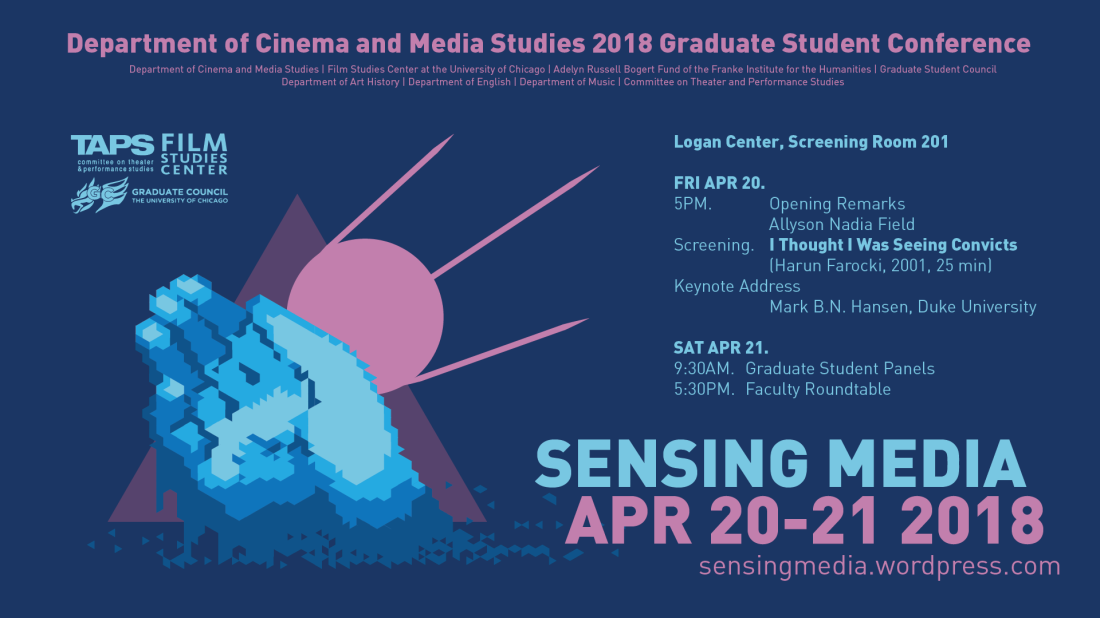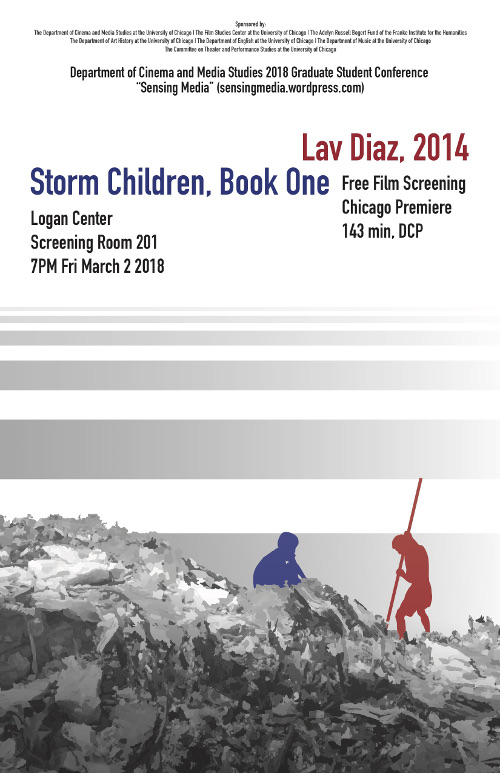

Conference schedule

Our schedule has now been posted! Please visit the Conference Schedule page for full details of the keynote and panels, as well as the Abstracts page for information on the panelists.
Looking forward to seeing everybody on April 20th & 21st!
Diaz’s STORM CHILDREN, BOOK ONE Tomorrow!

Extended Deadline
Please note, we have extended our deadline to ***February 9, 2018*** to allow for additional time after the New Year for submissions.
Submissions should be emailed to cms.sensing.media@gmail.com.
We plan to review abstracts in February and return decisions by the end of the month.
Email Update for CFP submissions
Our email has updated to a new address: cms.sensing.media@gmail.com
The previous email included on some distributed CFPs is still valid (uchicago.cms.gradconf@gmail.com), and any emails sent to that address will be automatically forwarded to the new one listed above. If you have any questions or concerns, please contact the new address.
We are looking forward to reading all submissions!
Call for Papers
Sensing Media
14th Annual Graduate Student Conference
Department of Cinema & Media Studies, University of Chicago
April 20th and 21st, 2018
Keynote Speaker: Mark B.N. Hansen, James B. Duke Professor of Literature, Duke University
Now more than ever, the human sensorium has become increasingly mediated along new spatio-temporal dimensions. Mobile interfaces, virtual and augmented reality, and neuroprosthetics bend the plastic topoi of our phenomenological horizons, allowing bodies to touch across multiscalar relations of time and space. This overwhelming effect of presence in our social and political epoch has launched novel lines of inquiry into how media are able to encode our sensory experiences and channel them into public and private forms of communication, intimacy, and community. Yet increasingly, such technologies are not simply tools for human perception, but also agents that monitor, encode, and structure their environments. If the human sensorium has been expanded in its vigorous mediation, then simultaneously, the same media are also reconfigured in their automated and distributed processing of our thoughts, sensations, and feelings. Do we sense media or do media sense us?
This conference invites research that probes the flows, velocities, and speculative trajectories that characterize “sensing media.” How do media sense their environment, translating physical and social space through biometrics, metadata analysis, or machine learning? How do we sense through media, expanding our perceptual limits to articulate the unfolding aesthetics of movement, emotion, sound, and thought? Finally, how do we sense the current state of media studies? What methodologies or histories might render legible the politics that enervate our mediated commons, and further shed light on what kinds of bodies have access to the forms of sensory experiences made available by past and present technologies?
Within this framework, we aim to energize an interdisciplinary investigation of the forms of subjectivity, sociality, and politics that emerge from “sensing media.” Our goal in rearticulating the contemporary and historical matrix of the mediated sensorium is to fracture open the human/non-human divide, revealing new questions of gender, race, class, and citizenship that pass through its margins. Across the epistemological, phenomenological, and perceptual rifts between the body and media, what contingent and inchoate forms of sensory experience might new paths of inquiry uncover?
Possible topic of papers might include, but are not limited to:
- Theories and histories of film movement and gesture (camera movement, motion studies, theories of performance)
- Touch, haptics, and phenomenologies of the moving image
- Sensing landscape and environment (Google Earth, drone vision, climate controlled clothing)
- Embodiment and body technics (the non-human, decorporealization, cyborg)
- Memory, media, and time
- The politics of sensation, voice, and image
- Surveillance media: biometrics, algorithms, CCTV
- Media archaeology and materialisms
- Representations and practices of synesthesia
- Disability, access, and wearable technology (neuroprosthetics and self-tracking apps)
- (In)visibility and minority politics in media
- Sound technology and musical performance (headphones, city soundscapes, Spotify algorithms)
- Remediating art, music, and literature (transmedia narrative, Met Opera: Live in HD)
- Play, games, and media
We welcome papers from a wide range of fields, including media studies, film theory and cinema studies, affect theory, music and sound studies, continental philosophy, art history, science and technology studies, theater and performance studies, and cultural studies. We especially encourage experimental essays, alternative styles of presentation, or any combination of theory and practice.
Please email an abstract (250-300 words) along with a short bio to co-chairs David Burnham, Gary Kafer, and Amy Skjerseth at: cms.sensing.media@gmail.com by January 15, 2018. Participants will be notified by the end of February.
NB: Note email address above. This may differ from the one listed on the distributed CFP. See our announcement on the homepage for more information.